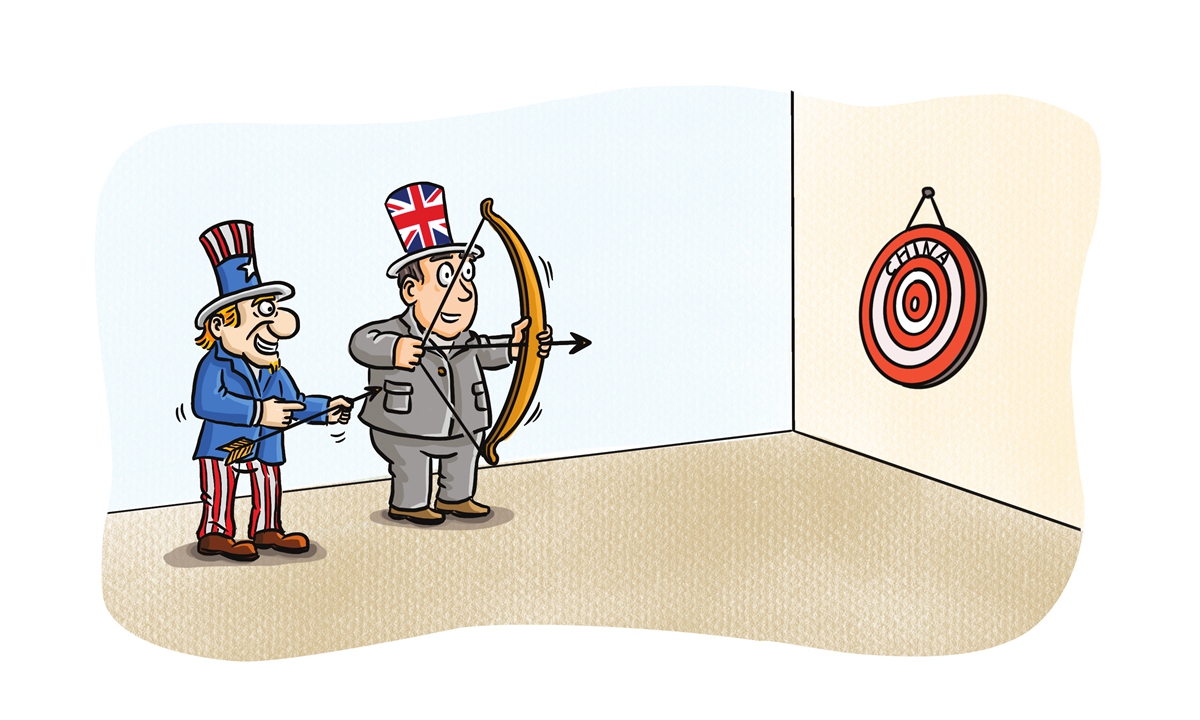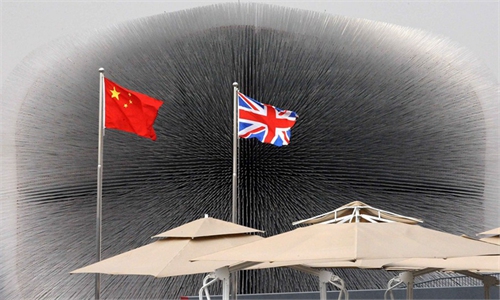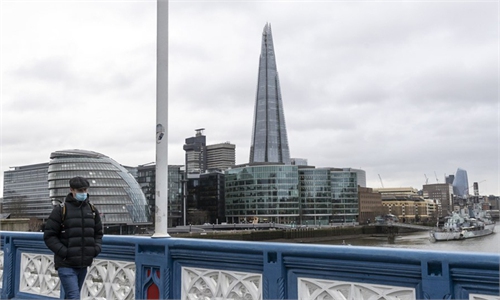
Illustration: Xia Qing/GT
Recently, the government of the UK has clearly marked a turning point in its relationship with China, ramping up hostility on a number of fronts. It has repealed the license of China Global Television Network (CGTN) to operate in the country, announced it expelled three Chinese journalists posing as "spies," placed more than 200 academics under investigation concerning alleged ties to China's defense industries and sought to frame itself as an "Indo-Pacific" power, and tried to create a D10 grouping of democracies aimed at Beijing. In tandem with all of these, the BBC has seemingly un-coincidentally ramped up hostile coverage over Xinjiang, seeking to solidify public support for such policies.The move mirrors that of Australia, and has been increasingly encouraged by the US. Yet Canberra might be forgiven for the fact that it is actually based in the Asia-Pacific region and has a stake in its future. Britain, on the other hand, is a European country that has turned its back on the continent, with drastic economic consequences, and is now set on burning bridges with Beijing, another one of its largest trade and investment partners. It is a foreign policy of absurd naivety which risks imposing economic and diplomatic isolation on the UK.
Boris Johnson once understood China was a crucial economic partner for the UK. When he became prime minister in July 2019, his stance toward Beijing was one of open enthusiasm, rather than hostility and confrontation. He was wise enough to recognize at that time that with Britain's departure for the EU, new economic partners would be needed to buffer the fallout of trade and investment. When the US attempted to strong arm him into banning Huawei, he initially refused.
But then, Boris decided to U-turn. As the COVID-19 pandemic ravaged across the world, the UK found itself suffering from it. Downing Street was ill prepared, and the prime minister decided ultimately to sacrifice the relationship with Beijing on scapegoating China for his own incompetence.
Things were never the same again. The "golden era" of relations between the UK and China had come to an end, much to the delight of right-wing rebels in the Conservative Party. These forces, having forced Britain out of Europe, now set a new target on Beijing. Boris gave in, and has since then staked his entire policy, erroneously dubbed "Global Britain," on succumbing to the US.
Things aren't going well. Despite putting China on the sacrificial altar to try and win a trade deal with the US, London and Washington failed to strike a deal during Donald Trump's tenure. Now, the Biden administration isn't interested. Since that time, the UK's GDP has tumbled by at least 11 percent owing to Boris' mismanagement of the COVID-19 pandemic.
But that isn't all. Recent data found that since the commencement of his much-lauded Brexit deal at the start of this month, Britain's exports to Europe have slumped by 64 percent. Similarly, the UK's own attempts to hijack the G7 into a greater anti-China alliance have proved a non-starter, with diplomats from France, Germany and Italy all pushing back unhappily at the ramifications of its focus.
Yet despite these mounting failures, Downing Street has continued to ramp up hostility toward Beijing on multiple fronts and present the UK, on an image of nostalgia, as a Pacific power that still believes that it has the muscle to bring China to kneel as in the Imperial era of old.
It doesn't.
Britain is effectively facing a crisis of identity whereby it is unable to realistically come to terms with its place in the world today and as a result is producing a foreign policy underpinned by no realism or pragmatism whatsoever. The ultimate product of this diplomatic mismanagement is that the UK faces the risk of growing diplomatic and economic isolation.
Ultimately, the UK will not find prosperity nor renewed global relevance on this new path. Blindly following the US is not a serious comprehension of national interest. Voices of reason are urgently needed, and right now the UK has none.
The focus should be on building partnerships and reviving its economy, still smaller in GDP terms than it was in 2007, as opposed to the glorious dream of a great power past that has all but ceased to exist and picking fights with countries and blocs far larger than it.
The UK and China may have different ideologies, outlooks and political systems, but one should be under no illusion that Britain's decision to crusade against China is a voluntary choice, and a bad choice at that.
The author is a British analyst of political and international relations and graduate of Durham and Oxford universities. opinion@globaltimes.com.cn



